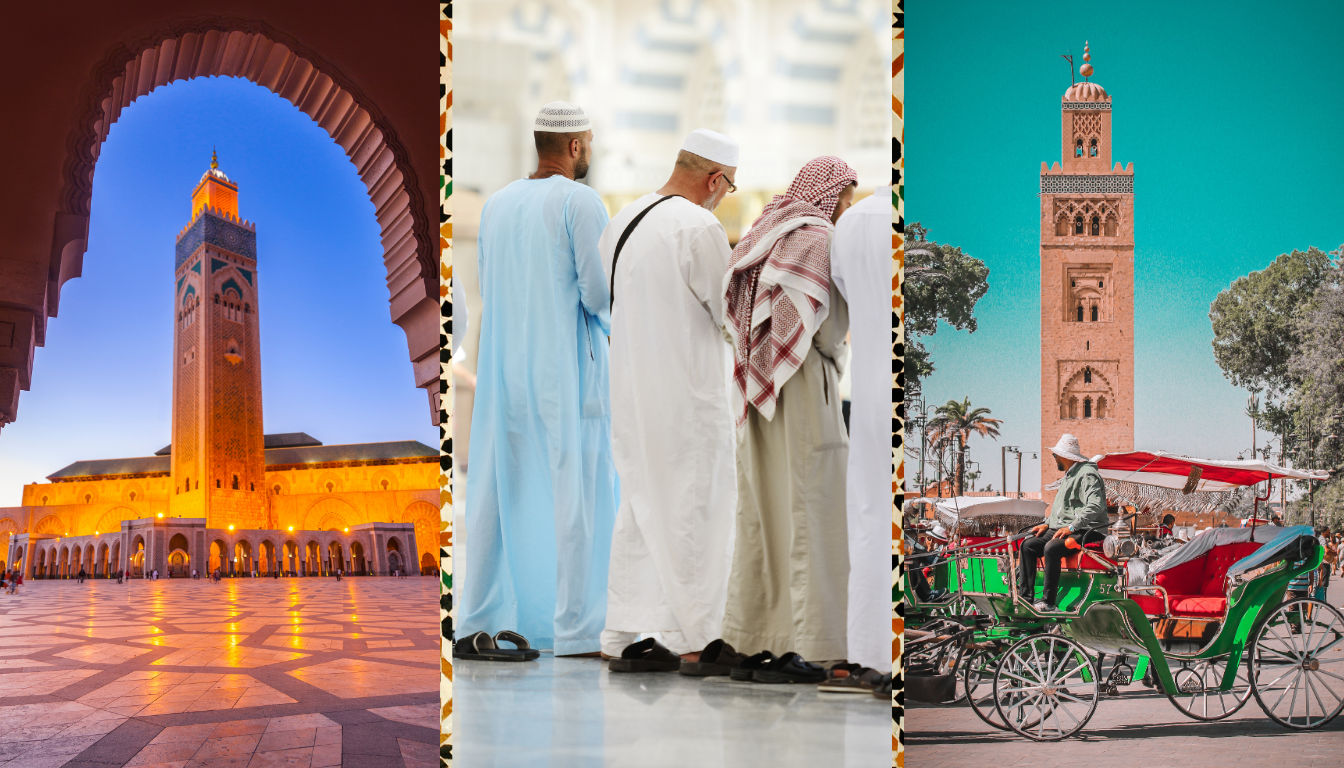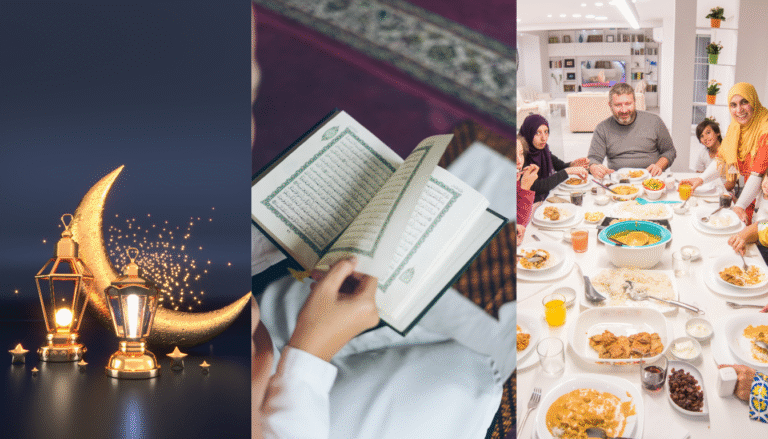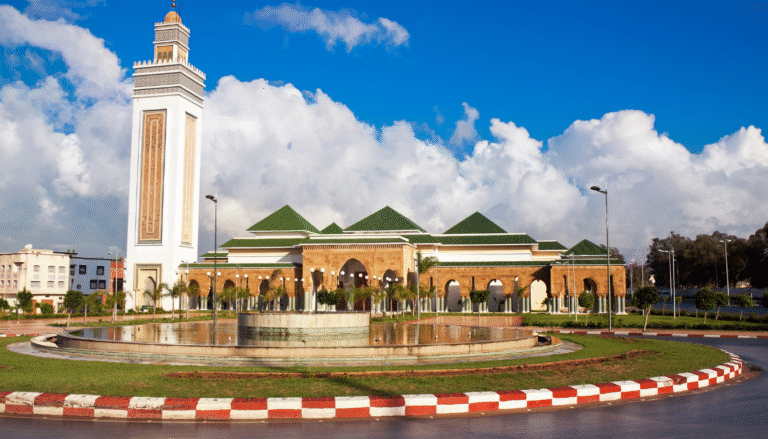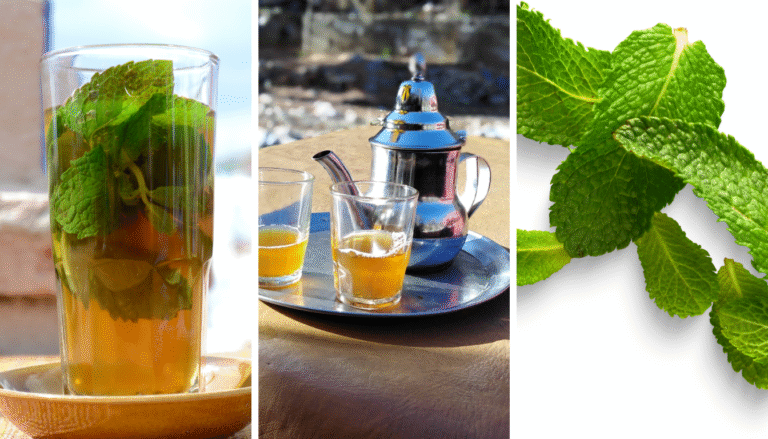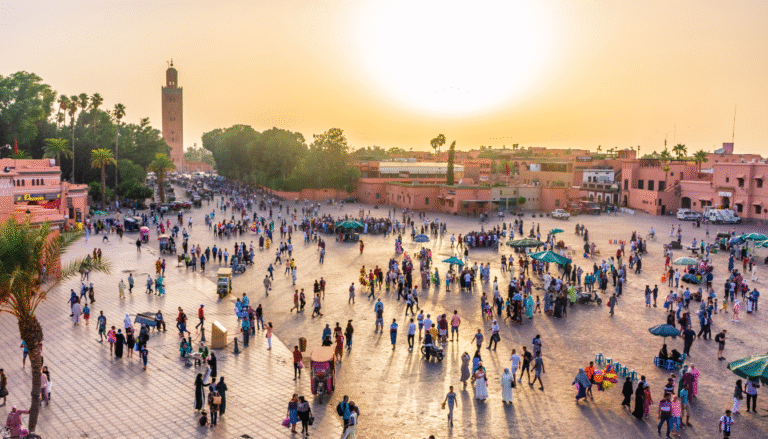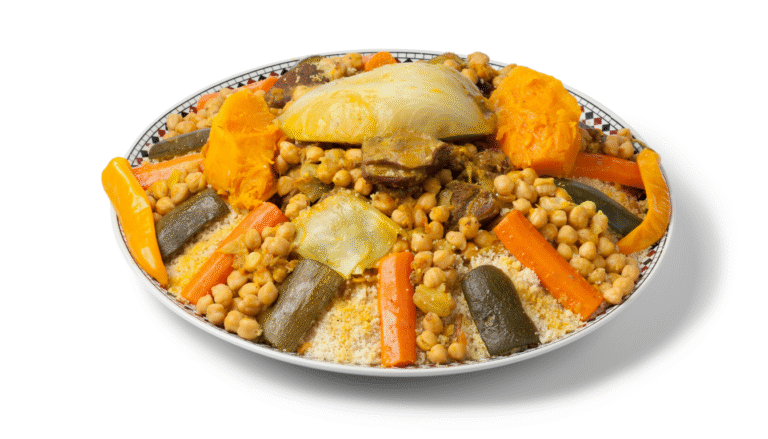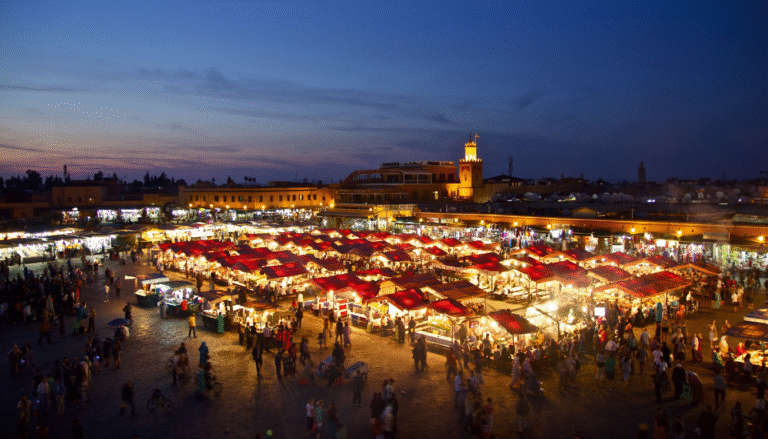Islam in Morocco: What Travelers Should Know About Local Customs
Are you planning a trip to a place where Islamic practices are deeply ingrained in daily life? It’s key to know the local customs and traditions. This way, you can fully enjoy your halal travel experiences.
In Morocco, over 99% of the population practices Islam. Knowing and respecting these customs can greatly enhance your visit.
Remember to dress modestly and understand the importance of prayer times. Being informed will help you move around the country with ease and respect. This guide will cover the essential customs and practices you need to know when visiting.
The Significance of Islam in Moroccan Culture
Islam has been a key part of Moroccan society for over 1,300 years. It has deeply influenced the country’s buildings, art, and lifestyle. As you travel through Morocco, you’ll see how Islam continues to define the nation’s spirit.
Historical Development of Islam in Morocco
The story of Islam in Morocco is both captivating and complex. It began in the 7th century and has grown over the years. Islam has shaped the customs and traditions of cities like Fez and Marrakech, as well as rural areas.
Islam as the State Religion Today
Now, Islam is Morocco’s official religion. It impacts many parts of everyday life, from schools to government. Visitors will see Islamic practices deeply embedded in Moroccan society, making it a muslim-friendly destination.
Religious Diversity in Modern Morocco
Even though Islam is the main religion, Morocco is also home to a minority of other faiths. This diversity is seen in the country’s lively cultural scene. Here, different religious traditions live together.
Exploring Morocco’s islamic heritage tours will give you a deeper insight into its rich culture. You’ll understand how Islam plays a big role in shaping its identity.
Essential Islamic Beliefs for Islam Morocco Travelers
To truly immerse yourself in Moroccan culture, it’s essential to understand the fundamental principles of Islam. These principles shape daily life in Morocco. As you explore this beautiful country, you’ll find that Islamic practices are deeply intertwined with the local way of life.
The Five Pillars of Islam
The Five Pillars of Islam are the foundation of Islamic practice. They include:
- Shahada: The declaration of faith, affirming the belief in one God and Muhammad as His prophet.
- Salat: The five daily prayers, which are a direct link between the individual and God.
- Zakat: Charity given to the needy, promoting a sense of community and social responsibility.
- Sawm: Fasting during Ramadan, a period of spiritual reflection and self-discipline.
- Hajj: The pilgrimage to Mecca, a once-in-a-lifetime obligation for those who are physically and financially able.
How Islamic Practices Shape Daily Life
Islamic practices significantly influence daily routines in Morocco. For instance, the call to prayer from minarets punctuates the day, reminding Muslims to pause for prayer. Understanding these practices can help you appreciate the cultural and religious fabric of the country.
Religious Authorities and Their Role
Religious authorities, such as imams and muftis, play a key role in guiding the community. They lead prayers, provide religious education, and offer guidance on Islamic law.
By understanding these essential Islamic beliefs, you’ll be better equipped to navigate everyday interactions during your visit to Morocco. This will show respect for local customs and enhance your overall travel experience.
Navigating Prayer Times During Your Visit
Exploring Morocco is more meaningful when you understand prayer times. The call to prayer occurs five times a day. It’s a key part of the daily life.
Understanding the Five Daily Prayers
The five daily prayers are vital in Islam. They are held at Fajr (dawn), Dhuhr (noon), Asr (afternoon), Maghrib (sunset), and Isha (night).
How Prayer Times Affect Business Hours
Prayer times can change business hours. Some shops might close during these times. Knowing this helps you plan better.
Respectful Behavior During the Call to Prayer
It’s polite to stop eating, drinking, or making noise during the call to prayer. This shows respect for the local culture.
Being aware of prayer times makes your visit to Moroccan mosques and Islamic landmarks in Morocco more respectful and enjoyable.
Dress Code Guidelines for Respectful Travel
Dressing modestly shows respect for Moroccan culture and Islamic traditions. It’s important for travelers to know the local dress code. Morocco is a conservative country, so visitors need to follow certain guidelines for a respectful and fun trip.
Appropriate Attire for Women Travelers
Women should cover their hair, arms, and legs in public. Use a scarf or hat for your hair, and wear loose clothes to stay cool and modest. It’s a good idea to pack clothes that can be mixed and matched for different outfits.
Dress Expectations for Men
Men should also dress modestly, avoiding shorts and sleeveless shirts. Wear long pants and shirts with sleeves, mainly when visiting mosques or rural areas. This way, you’ll blend in and show respect for local customs.
Regional Variations in Conservative Dress
Dress codes vary by region, with some areas being more conservative. Knowing these differences helps you pack right and avoid any offense.
Packing Tips for Cultural Sensitivity
When packing for Morocco, include:
- Loose-fitting clothes that cover your arms and legs
- A scarf or hat for your hair (for women)
- Comfortable shoes for walking
- Modest swimwear for beach or pool activities
| Occasion | Recommended Attire | Additional Tips |
|---|---|---|
| Visiting Mosques | Long pants, long-sleeved shirts, headscarf (for women) | Remove shoes before entering |
| Rural Areas | Conservative clothing, covering arms and legs | Be mindful of local customs and traditions |
| Beach or Pool | Modest swimwear | Cover up when leaving the beach or pool area |
Dressing modestly and respecting local customs makes your halal travel experiences better. It also helps you engage deeply with islamic culture exploration. Cultural sensitivity is key to a respectful and enjoyable trip.
How to Visit Moroccan Mosques as a Non-Muslim
Visiting Moroccan mosques can be a deep experience for non-Muslim travelers. It gives a peek into Islamic architecture and spirituality. Some mosques, like the Hassan II Mosque in Casablanca, are open to non-Muslims.
Mosques Open to Non-Muslim Visitors
Some mosques in Morocco let non-Muslims in, showing Islamic architecture and culture. The Hassan II Mosque, one of the biggest mosques, offers tours for visitors.
Entry Requirements and Visiting Hours
To visit mosques like Hassan II, knowing the rules is key. Visitors usually join guided tours at set times. It’s important to dress modestly and remove shoes before entering.
Proper Etiquette Inside Sacred Spaces
Respecting the mosque is vital. Dress right, be quiet, and follow the guide. Removing your shoes and covering your hair shows respect.
Photography and Behavior Guidelines
Photography rules change; check with your guide first. Be quiet and don’t disturb prayers or events. Following these rules makes your visit respectful and meaningful.
Experiencing Ramadan as a Visitor
Ramadan in Morocco is a time of spiritual reflection, community, and feasting. It offers visitors a unique chance to experience local culture. You can gain a deeper understanding of Islamic traditions that shape daily life during this holy month.
Understanding the Holy Month’s Significance
Ramadan is a significant period in Islam, marked by fasting from dawn to dusk. It’s a time for spiritual growth, self-reflection, and community bonding. Knowing the significance of Ramadan will make your travel experience richer, allowing you to appreciate local customs and practices.
Daytime Eating and Drinking Etiquette
During Ramadan, it’s important to be respectful of those fasting. Avoid eating and drinking in public during the day. This includes not smoking or consuming food or beverages in public areas.
Participating in Iftar and Evening Celebrations
Participating in iftar, the breaking of the fast, and evening celebrations is a great way to connect with the local community. Many restaurants and hotels host iftar dinners. This offers a unique chance to experience Moroccan cuisine and hospitality.
Travel Tips and Considerations During Ramadan
When traveling during Ramadan, be aware of the impact on business hours and public services. Some businesses may have reduced hours, and public transportation might be less frequent. Planning ahead and being flexible will help you make the most of your visit.
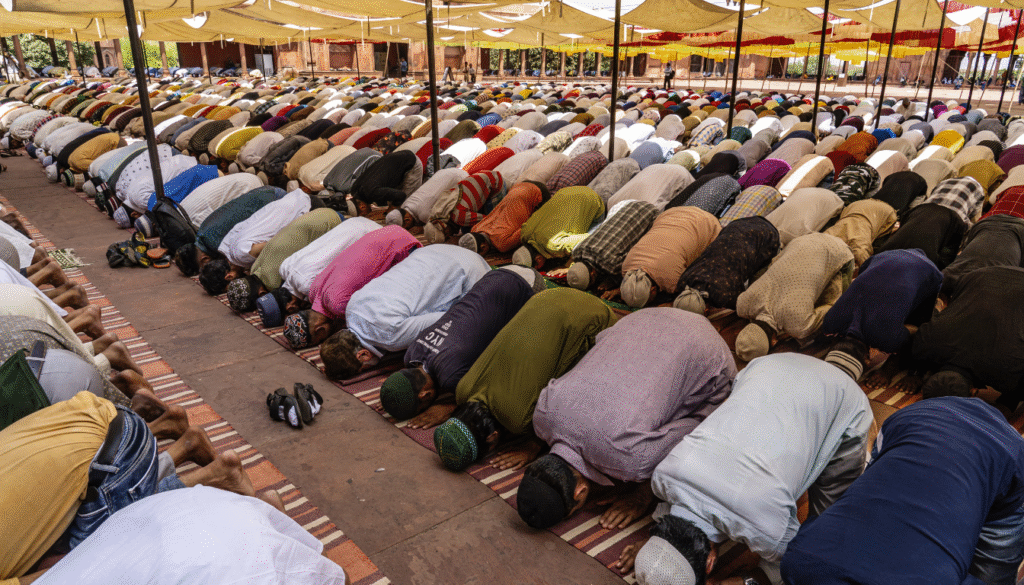
By being respectful and open-minded, you can have a meaningful and enriching experience during Ramadan in Morocco. Take the opportunity to engage with locals, try traditional foods, and explore cultural events and celebrations during this special time.
Halal Food Practices and Dining Customs
Exploring Morocco means diving into halal food, a big part of Islamic culture here. Knowing and respecting these customs can make your trip better.
Understanding Halal Dietary Requirements
Halal food follows Islamic law, which lists what Muslims can eat. In Morocco, all food in restaurants and hotels is halal. This is because the country follows Islamic dietary laws closely.
Key aspects of halal dietary requirements include:
- Meat must come from animals slaughtered the Islamic way.
- Forbidden animals include pigs and carnivores.
- Blood and blood products are not eaten.
Must-Try Traditional Moroccan Halal Dishes
Moroccan food is rich and varied, with many tasty halal dishes. Some dishes you should try are:
| Dish | Description |
|---|---|
| Tagine | A slow-cooked stew named after the clay pot it’s cooked in. |
| Couscous | A traditional North African dish from semolina flour, often with vegetables and meat. |
| Pastilla | A savory pie with layers of flaky pastry, meat, and spices. |
Dining Etiquette and Hand Washing Rituals
Dining in Morocco is deeply rooted in Islamic traditions. It’s important to wash your hands before and after meals. When eating, use your right hand, as using the left is seen as impolite.
“Hospitality is a sacred duty in Moroccan culture, and dining with locals can be a rewarding experience if you show respect for their customs.”
Alcohol Policies in an Islamic Country
Even though Morocco is an Islamic country, alcohol is available in some tourist spots and fancy hotels. It’s important to respect local customs and laws about drinking alcohol.
Navigating Gender Relations and Social Interactions
Morocco’s conservative norms shape social interactions and gender relations. It’s key for travelers to know these cultural rules. Understanding them can greatly improve your trip.
Appropriate Greetings Between Men and Women
In Morocco, greetings are a big part of the culture. When meeting locals, using the right greetings is important. Men and women usually shake hands or say hello, but avoid touching unless it’s okay.
Public Behavior and Displays of Affection
Public affection is not welcomed in Morocco. Travelers should be careful not to upset locals. Don’t hold hands or kiss in public as it’s seen as rude.
Special Considerations for Women Travelers
Women travelers need to know the local customs and dress modestly. Wearing respectful clothes helps you fit in and stay safe.
LGBTQ+ Travelers: Cultural Context and Safety
LGBTQ+ travelers should know Morocco’s views on LGBTQ+ issues are conservative. Being careful and discreet is wise to have a safe and respectful visit.
Islamic Holidays and Festivals Worth Experiencing
Morocco’s culture shines during Islamic holidays. These events offer a deep dive into the country’s rich heritage. Islamic heritage tours in Morocco are a great way to see this.
Eid al-Fitr Celebrations
Eid al-Fitr marks Ramadan’s end in Morocco. The country buzzes with joy, featuring traditional foods, decorations, and prayers. Travelers get to feel Morocco’s warm welcome during this time.
Eid al-Adha Traditions
Eid al-Adha, or the Festival of Sacrifice, is a big deal in Morocco. Families unite, and the air is filled with generosity. You can join in the rituals and try local dishes.
Other Significant Religious Observances
Morocco also celebrates the Prophet’s Birthday. These events are key to the country’s spiritual life. They give a peek into Morocco’s rich history.
Planning Your Trip Around Islamic Holidays
Planning your Morocco trip around Islamic holidays is smart. Some services might be different, but you’ll get to see local culture up close. Here’s what you can expect:
| Holiday | Date | Expectations |
|---|---|---|
| Eid al-Fitr | End of Ramadan | Festive atmosphere, traditional foods, communal prayers |
| Eid al-Adha | 70 days after Eid al-Fitr | Family gatherings, traditional rituals, local cuisine |
Morocco is a muslim-friendly destination. Its Islamic holidays are a trip highlight. With the right planning, you can enjoy the celebrations and respect local traditions.
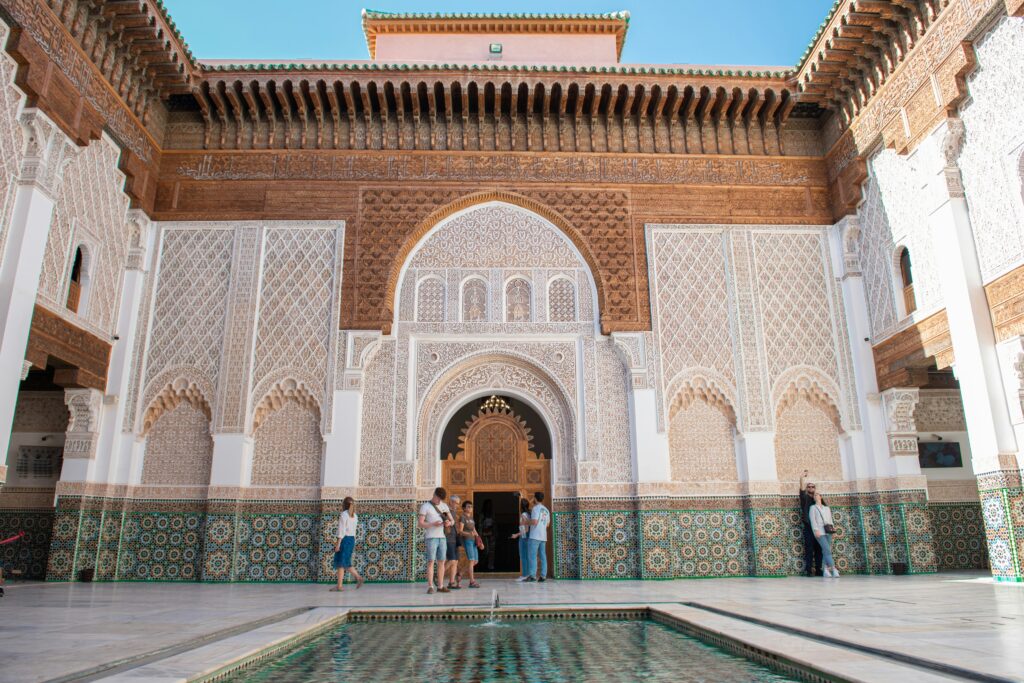
Must-Visit Islamic Heritage Sites in Morocco
Exploring Morocco’s Islamic heritage reveals a wealth of significant sites. These places showcase the country’s architectural and cultural beauty. Morocco boasts many historic and culturally important Islamic sites, reflecting its rich history and cultural identity.
Iconic Mosques and Their Significance
Morocco is famous for its beautiful mosques, each with its own architectural style and historical importance. The Koutoubia Mosque in Marrakech is a standout, known for its tall minaret that towers over the city. “The Koutoubia Mosque is a masterpiece of Almohad architecture”, highlighting the region’s Islamic heritage.
Ancient Medersas and Religious Schools
The ancient medersas, or religious schools, are a key part of Morocco’s Islamic heritage. The Medersa Ben Youssef in Marrakech is a prime example. It showcases stunning Islamic architecture and the role these institutions played in education and religion.
Sufi Shrines and Spiritual Centers
Morocco is also known for its Sufi shrines and spiritual centers. These places are important in the country’s spiritual life. They draw visitors from all over, seeking spiritual growth and connection with Morocco’s Sufi heritage.
Islamic Art and Architecture Highlights
The Islamic heritage sites in Morocco are not just important for their history and religion. They are also known for their beautiful art and architecture. From detailed tile work to ornate calligraphy, these sites showcase the artistic richness of Islamic civilization.
Common Misconceptions and Cultural Sensitivities
When you visit Morocco, knowing the common misconceptions about Islam and local customs is key. Understanding the Islamic culture in Morocco makes your trip better. It also helps you interact with locals in a respectful way.
Separating Fact from Fiction About Moroccan Islam
Morocco practices a moderate form of Islam, often misunderstood by others. Moroccan Islam is known for its tolerance and openness. It combines traditional practices with a moderate view of religious laws.
- Morocco’s religious practices are deeply rooted in its history and cultural heritage.
- The country’s Islamic identity is complemented by its diverse cultural influences.
- Understanding this blend helps travelers appreciate the local customs and traditions.
Understanding Morocco’s Moderate Islamic Practices
Morocco’s moderate Islamic practices are seen in its legal system, social norms, and daily life. The country’s approach to Islam is pragmatic and adaptive. It balances religious duties with modern life.
- The Moroccan government actively promotes a moderate form of Islam.
- Religious education is emphasized to promote understanding and tolerance.
- Social norms reflect a blend of Islamic values and cultural traditions.
Topics to Approach with Sensitivity
When talking to locals, some topics need sensitivity and understanding. Religion, cultural practices, and social norms are areas where being respectful can make a significant difference.
Building Respectful Cross-Cultural Connections
To connect with the local community, travelers should be aware of cultural differences. Showing genuine interest in local customs is important. Engaging in respectful dialogue and showing appreciation for Islamic traditions can greatly enhance your experience.
- Learn a few basic Arabic phrases to show respect.
- Be open to learning about local customs and practices.
- Show appreciation for the cultural heritage you encounter.
Conclusion: Embracing Morocco’s Islamic Heritage
Exploring Morocco can be much better if you understand and respect local Islamic customs. Knowing the dress code, prayer times, and where to find halal food makes your visit richer. By embracing Morocco’s Islamic heritage, you get to see the country’s true culture, making your trip unforgettable.
Your time in Morocco can be truly special if you dive into the local culture and traditions. Visiting famous mosques, joining iftar during Ramadan, or just talking to the locals can be rewarding. Showing respect for Islamic customs will leave a positive and lasting impression.

